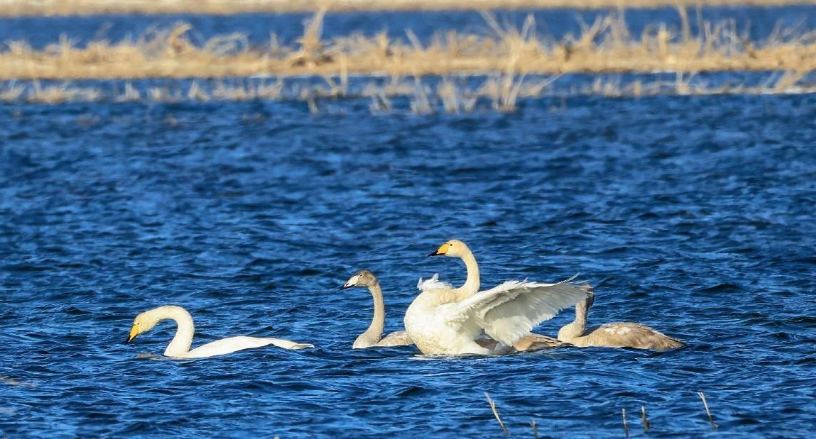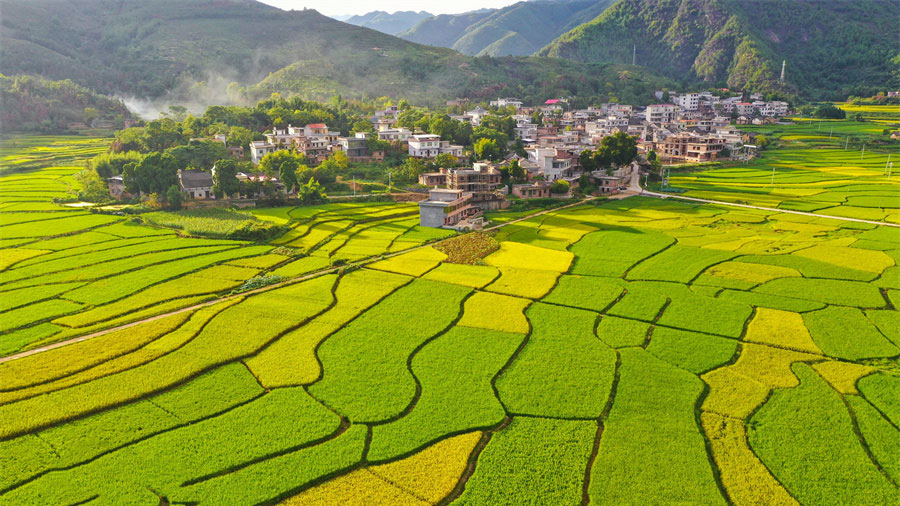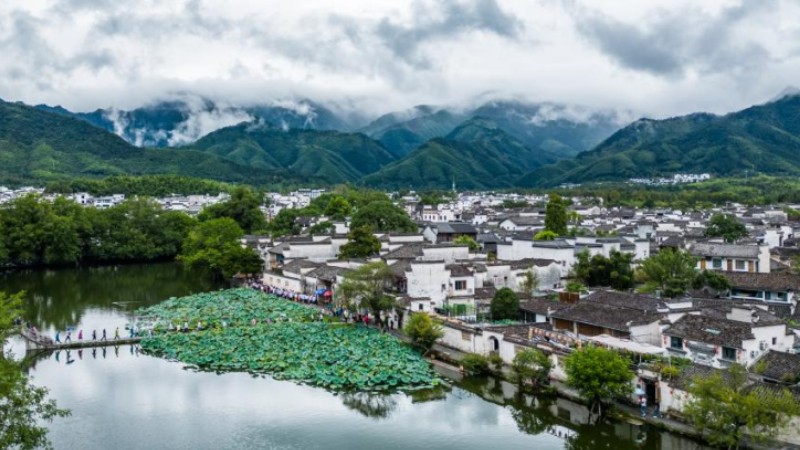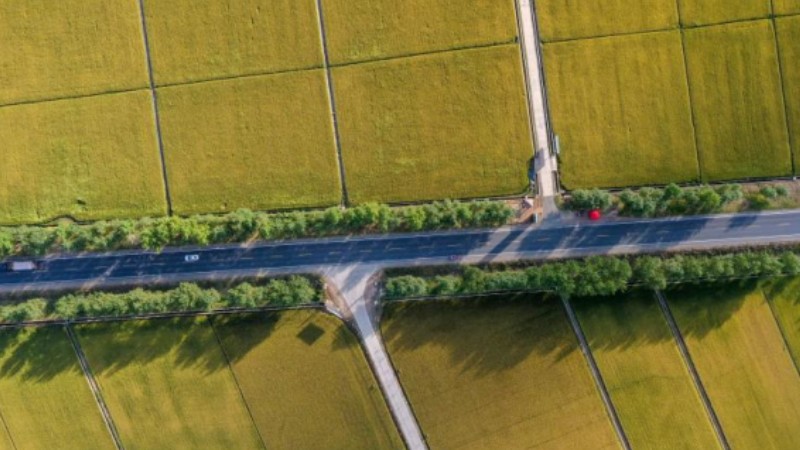A green crusade for prosperity: Chinese rice in Africa helps battle hunger and poverty

Bitrus Bawa Salka, now 41 years old, has worked with Chinese agricultural experts to plant crops throughout Nigeria for nearly a decade. Photo by Chi Zao.
The wet season is the favorite time of year for Nigerian farmers. The pitter-patter of sweet drops quench the soils, bringing nature's magic to the farmlands. The paddy fields strengthen from a dusty brown to deep mahogany, reviving a healthy glow the locals have longed to see return.
Rice is indigenous to Nigeria and has been cultivated there for 3,500 years. Nonetheless, the country's lack of modern irrigation technologies, combined with the low productivity of local rice species, has resulted in a significant deficit in rice production and consumption, with only 57 per cent of the 6.7 million metric tons of rice consumed in Nigeria annually produced locally, according to Food and Agriculture Organization of the United Nations statistics (FAO).
With a rapidly growing population of over 200 million and hunger and malnutrition prevalent, ramping up local production of dominant staples like rice is crucial for Nigeria to attain food security and lift millions of people out of poverty.
That is why the Chinese Agricultural Demonstration Centre in Abuja, Nigeria's capital, serves as a grand stage for the country's rice rock stars.
Bitrus Bawa Salka, 41 years old, has collaborated with Chinese agricultural specialists for nearly a decade. They have been working to promote a Chinese-developed rice variety that suits the environment of Nigeria and can produce 30 per cent more rice than the native type.
"In Nigeria, a proverb says, 'One broom cannot sweep'. The Chinese have cutting-edge farming technology, while Nigeria has large swaths of fertile lands. By working together, we can turn Nigeria into Africa's granary, ensuring that our people are never hungry again," he said.
Building Africa’s granary

Wang is well respected in his field of agriculture in Nigeria, where he has spent the past two decades of his life working to advance the country's farming practices. Photo provided by Wang Xuemin.
In a suburb of Abuja, eight Chinese agricultural experts and 50 local apprentices work at the massive farming demonstration centre of Green Agriculture West Africa Ltd. (GAWAL), a Chinese enterprise founded in 2006 to facilitate China-Nigeria agricultural cooperation.
Bitrus has spent the last few months studying how to fertilise Chinese cabbages in the Centre's vegetable garden from his Chinese teacher, 55-year-old agricultural specialist Wang Xuemin. Wang arrived in Nigeria in 2003 as a technical adviser for a program funded by China-Nigeria South-South Agricultural Cooperation. Since then, he has spent nearly two decades working in the country's agricultural sector, introducing new farming techniques and a more productive rice variety to Nigeria.
In his early days in Anambra, Nigeria, Wang noticed that one of the major obstacles to the production of local rice was the lack of appropriate technologies. Without modern machines, locals used their bare hands and clubs to remove the seeds from the stalks and husks.
"We assisted locals in setting up small factories to manufacture threshing machines using Chinese technology, resulting in a five to sevenfold increase in threshing output. We also provided the patent to local farmers for free, and the equipment is currently utilised throughout Nigeria thanks to FAO promotion," said Wang.
Encouraged by the success of their efforts to promote machinery in Nigeria, Wang and his Nigerian colleagues planned to take the next step by developing a rice variety that is better adapted to the country’s climate and that produces more food.
Nigeria has a long history of rice farming, but the country's native rice types are not very productive, and few new cultivars have been introduced in recent decades. According to Wang, from its independence in 1960 till 2019, Nigeria had just 70 officially approved rice varieties, while in China, hundreds of cultivars are approved yearly.
The first year Wang and his African colleagues introduced Chinese rice varieties to Nigeria, they cultivated 600 hectares of paddy fields, expecting a production of 4,000 tons of rice. The result was only 300 tons.
“We need to breed a variety that does well in the Nigerian climate if we're going to increase food production,” said Wang.

In 2005, Wang taught Nigerian farmers how to use threshing machines. Photo provided by Wang Xuemin.
Wang and his Nigerian coworkers spent years experimenting with different methods before finally releasing their 2017 rice variety, Gawal R1. It yields roughly 30 per cent higher and grows five to seven days faster than the local rice type Faro 44.
“We promoted our rice in Kebbi state's Aurgungu, Zamfara state's Bakolori, and Jigawa state's Hadeja, and all of our rice seeds were ordered by local farmers even before they ripened,” said Wang.
Over the previous five years, the Chinese rice variety has increased Nigeria's rice output by over two million tons, benefiting over 200,000 farming households. Bitrus and his Nigerian colleagues have even set up a WhatsApp group called the "Gawal R1 seed farmers forum," instructing local farmers on how to increase their rice yields and use innovative agricultural techniques.
"In 2019, Nigerian farmers harvested an average of 1.98 tons of rice per hectare. By 2022, that figure had risen to 2.5 tons. I'm quite proud of the work we and our Chinese friends have done for the cause," said Bitrus.
After improving local agriculture technology for over two decades, Wang hopes to use his final five years before retirement to export China's perennial rice technologies to Africa.
"I hope we can feed all of Africa with our improved rice varieties and cutting-edge farming technologies. With the help of my African colleagues, I have set a five-year objective to realise this vision," said Wang.
A green dream coming true

Stephen Elisha, a 28-year-old student majorings in economics at Veritas University in Abuja, has been learning agricultural technologies with Chinese specialists like Wang for years. Photo by Chi Zao.
Bitrus and his fellow Nigerians at the centre aren't the only ones who have profited from the knowledge the Chinese agricultural experts have shared with them.
Since 2006, GAWAL has trained at least five technical personnel annually for Nigeria's Kebbi state. The China-aided Nigeria Agricultural Demonstration Center in Abuja, which has modern equipment, classrooms and research fields, has also provided training for locals.
According to Wang, who is now assistant general manager at GAWAL, before the pandemic, the centre provided two training sessions on an annual basisa year for Nigerian agro-technicians, which trained over 400 Nigerian students between 2016 and 2019, while the costs were all covered by the Chinese government.
Stephen Elisha, a 28-year-old student majoring s in economics at Veritas University in Abuja, has been learning agricultural technologies with Chinese specialists like Wang for years, and he is now a Chinese rice expert in Abuja.
"I was born in a little village in Kagarko, where many people died in a famine when I was two years old. I've seen how our people suffered from starvation, and I don't want that to happen again," said Stephen.
“Learning economics in college taught me the value of agriculture to Nigeria's development, and making quick money by selling our oil will not bring us very far. Developing our agricultural sector is essential if we are to end hunger and poverty,” added Stephen.
The young Nigerian agricultural specialist claimed he had learned a lot from China's experience, a country that, many decades ago, endured food shortages and famine. He believes that by collaborating with the Chinese, Nigerians will be able to address the country's food insecurity while feeding its people.
“With my knowledge of economics and agriculture, I hope to create my own seed company in the future, using what I've learned from my Chinese friends to solve famine in Nigeria,” said Stephen.
Photos
Copyright © 2023 People's Daily Online. All Rights Reserved.









